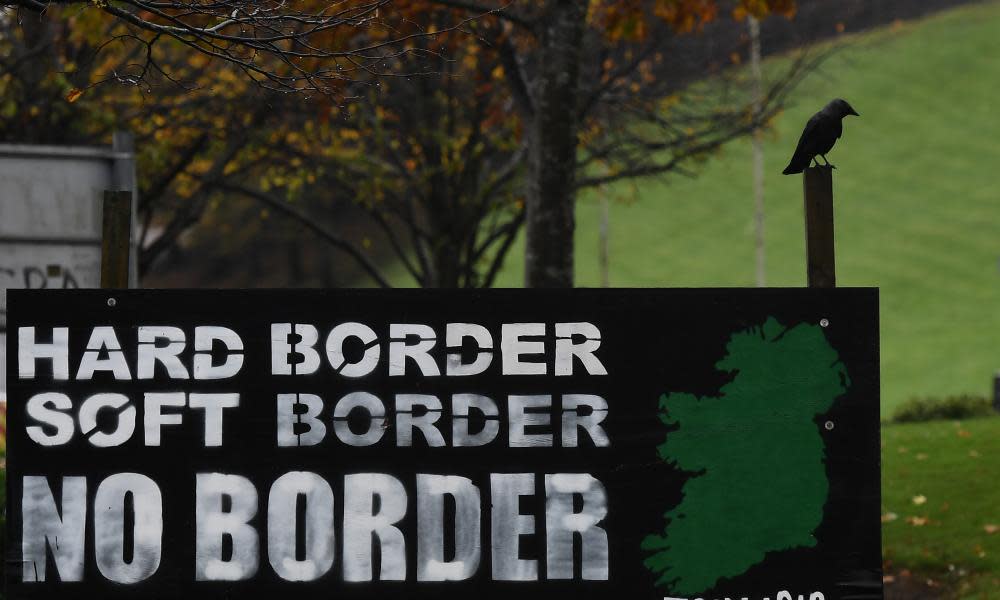Keir Starmer: May must publish Irish border backstop plan

Labour is pressing the government to give MPs the chance to debate Theresa May’s plans for the Irish border backstop before she flies to a crunch summit with EU leaders this week.
Brexit secretary Dominic Raab returned from Brussels on Sunday night without agreement, after face-to-face talks with his EU counterpart, Michel Barnier.
Disagreement centres on the backstop – the legally enforceable protocol insisted upon by the EU27 to prevent a hard border arising in Ireland.
Keir Starmer said it was “deeply disappointing” that no deal had been reached. The shadow Brexit secretary said: “The details of any proposed backstop agreement need full and searching scrutiny in parliament, not least because the final deal will need parliamentary approval.
“I would therefore urge the prime minister to publish the latest backstop proposal today – alongside an oral statement – to provide sufficient time to scrutinise and debate it.”
His intervention came as the government looks increasingly likely to need the votes of Labour MPs to get a Brexit deal through, with many of its own backbenchers expected to rebel.
Downing Street has not made clear whether, or when, a text of the backstop would be published, but the cabinet is scheduled to discuss Brexit on Tuesday.
May is struggling to convince even some at the top table to sign up to her backstop plan, which is expected to commit the UK to remaining in a customs union indefinitely; while leaving just Northern Ireland largely inside the single market, with Stormont’s approval.
That has alarmed both pro-Brexit ministers and MPs, who object to the idea of ongoing customs union membership; and the DUP, who believe the single market aspect of the plan will inevitably result in border checks between Northern Ireland and the UK.
Negotiations have centred on whether – and how – the UK would be able to extricate itself. A Downing Street spokeswoman insisted on Friday that “the prime minister would never agree to a deal which would trap the UK in a backstop permanently,” but the EU27 have consistently made clear they will not allow a specific date to be included.
Starmer said putting May’s plans before parliament would “allow her to test if the proposal has the support of MPs. If ministers fail to do so, we can only conclude that it is because they know they may not command the confidence of their party or the Commons on a central plank of their negotiating strategy,” he said.
With MPs due to be given a vote on the final deal, May’s whips are keen to win over enough Labour MPs to offset a sizeable rebellion by Brexit hardliners on her own side of the house. She will argue that a combination of the backstop and the promise of a smooth future trading relationship is a pragmatic approach that should assuage many of Labour’s concerns.
But Starmer will address Labour MPs alongside Jeremy Corbyn at the weekly meeting of the parliamentary party on Monday night and underscore his judgment that so far May’s stance does not meet the party’s “six tests” for assessing Brexit.
Tory whips are keen to pick off Labour MPs from Brexit-backing constituencies, some of whom are worried their constituents will fear they are trying to reverse the referendum result if they reject May’s deal. Fifteen Labour MPs rebelled against Corbyn in June to reject an amendment aimed at keeping Britain in the European Economic Area, believing it smacked of an attempt to overturn the referendum result.
The shadow cabinet will discuss Labour’s strategy on Brexit for the next few crucial weeks on Tuesday. Senior Labour sources insist the frontbench will not back May’s deal, even if she makes further concessions on key areas of concern such as environmental protections and workers’ rights, where the commission is demanding assurances that the UK will not undercut EU firms.
But privately some acknowledge a lengthy status quo transition period, potentially extending beyond 2020, plus a backstop that would effectively keep the UK in a customs union if all else failed, is much closer to Labour’s position than May’s starting point.
“She is walking towards us – but she hasn’t come nearly far enough,” said one.
Some shadow cabinet members are concerned the party has not yet done enough to convince the public that they have a distinctive approach to Brexit.
Starmer brokered a complex “composite motion” at the party’s conference last month that said all options were on the table if May’s deal is rejected by parliament. Starmer suggested in his conference speech that did not exclude a referendum where “remain” could be an option on the ballot paper.
But senior Labour sources suggest that if May lost the meaningful vote, the party would first press for her to return to Brussels and shift her negotiating stance towards a deal including a customs union, that could then win the backing of parliament.
Corbyn told May in his own speech in Liverpool: “If you deliver a deal that includes a customs union and no hard border in Ireland, if you protect jobs, people’s rights at work and environmental and consumer standards, then we will support that sensible deal.”

 Yahoo News
Yahoo News 
